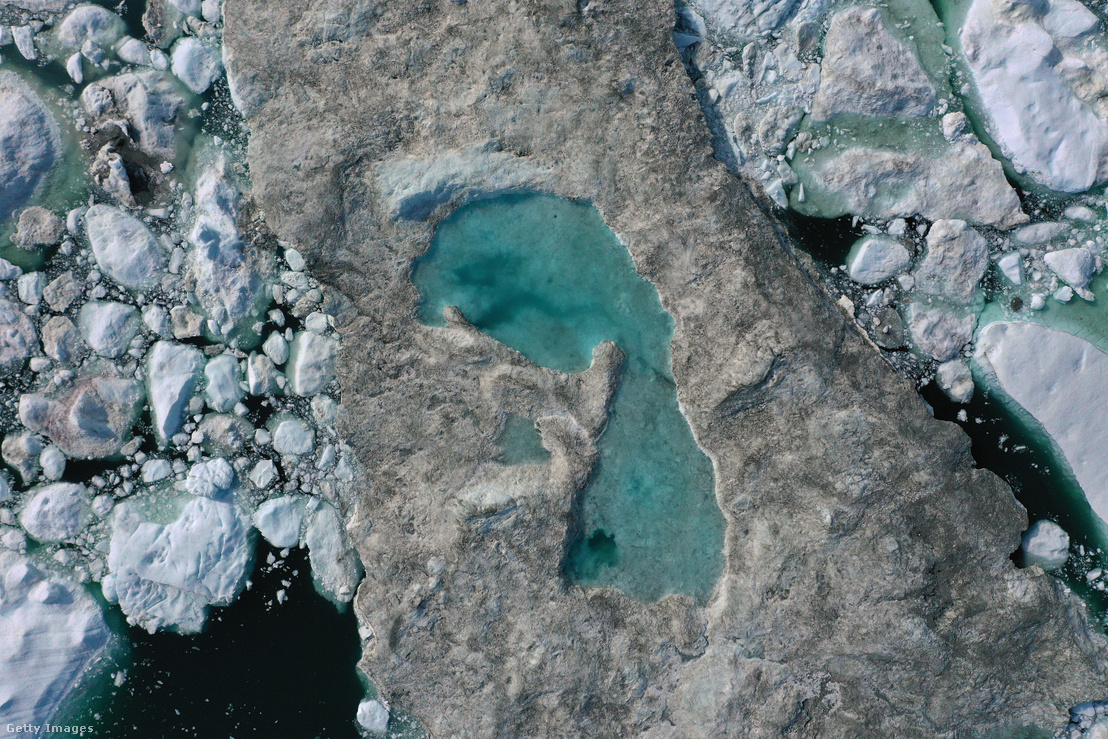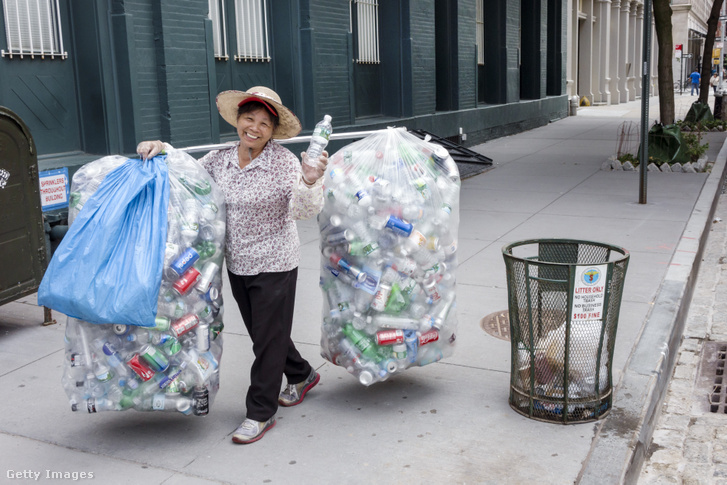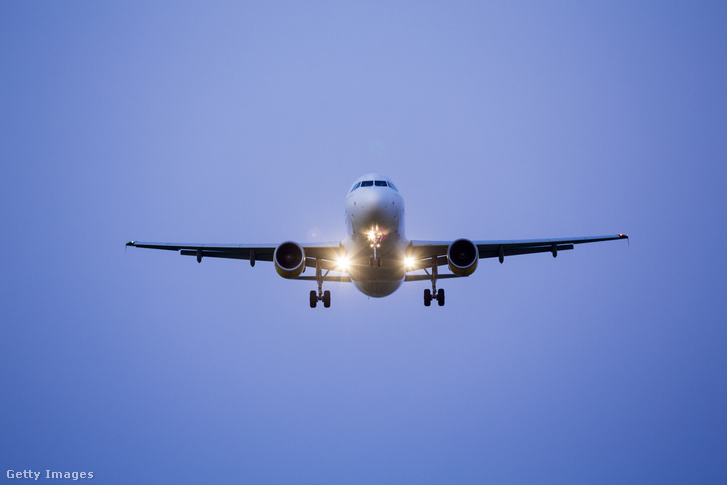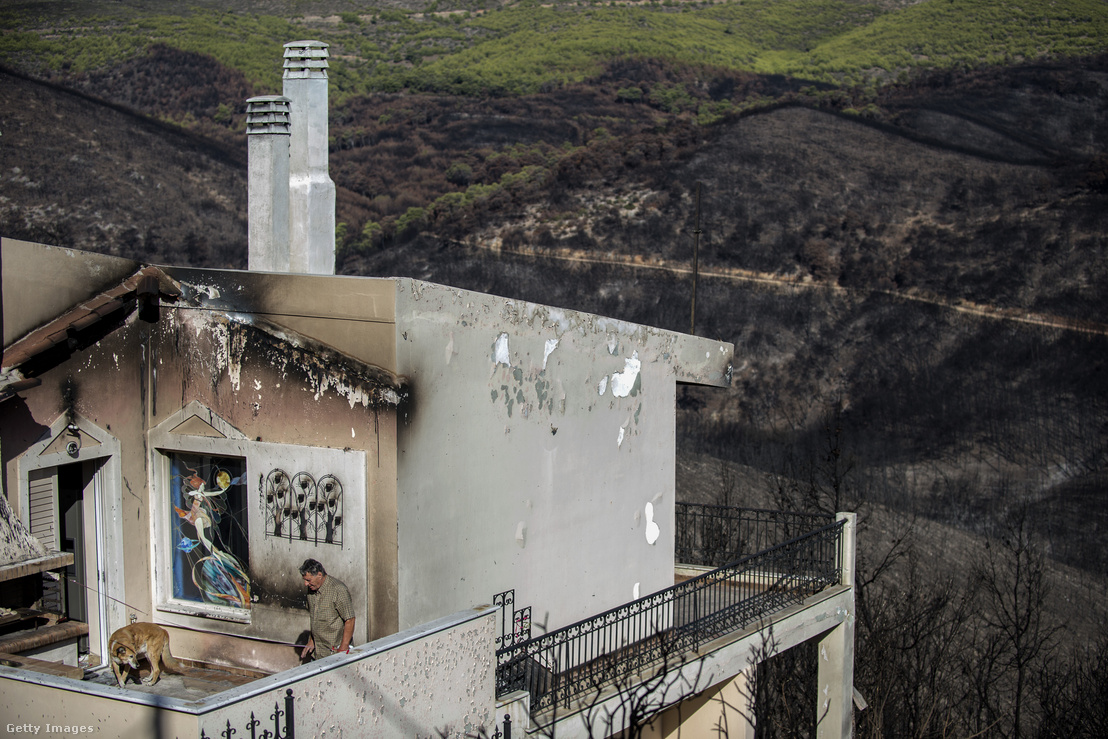To defeat climate change, we must first defeat ourselves

Climate change is not simply around the corner, but it is happening at this very moment, and it does not only affect our environment but our mental health as well. More and more people suffer from eco-anxiety, but is that an actual disease, or is it only an adequate reaction to a real threat? How can we take back control? Is it enough if we expend some effort, or do we have to make fundamental changes to our lifestyles to be ready to combat it? Can the happiness-industry save consumer culture, or can we only avoid the climate disaster at this point by a complete overhaul of the system we live in? We sat down with psychologists to discuss the effects of a planetary crisis on our mental health.
Covering Climate Now
This article is published as a part of Index's partnership with Covering Climate Now, a global collaboration of more than 250 news outlets to strengthen coverage of the climate story. The English edition of Index regularly covers the most relevant stories of Hungary. If you would like to know more, visit our website, or follow us on Twitter and Facebook.
Not that long ago, climate change was only a hazy, distant topic, and even though it was brought up here and there, it mostly remained the interest of the niche group of researchers and environmental activists with seemingly too much time on their hands. In recent years though, climate change irrevokably became a part of our daily lives, we are constantly being bombarded with news of environmental destruction and apocalyptic but worryingly realistic predictions, and the public discourse became all about how time is running out, how the window for action is closing, and how we must to do something as long as we still can.
But the question that is not mentioned so often yet is how the quickly deteriorating climate change and the ceaselessly ringing alarm bells are impacting our mental health. As more and more people are grasped by fears fed by news of climate change, the permanent existential dread can easily turn into full-blown anxiety.
Climate or eco-anxiety is a relatively new, but more and more frequently mentioned term. But what is it, what can we do about it, and is it an actual disease at all as the name suggests, or is it a real worry about a very real crisis that we will have to live with? Is there a way to control our fears?
Real danger. Exaggerated fears?
Basically anything is capable of triggering anxiety, even seemingly innocuous things, which is why anxiety is, at its core, irrational. Usually, there is a deeper, underlying cause for the anxieties experienced, and these deeper fears get projected onto the object of anxiety. In this sense, anxiety about climate change is not unlike any other anxiety, says environmental psychologist Andrea Dúll, the head of the Organisational and Environmental Psychology Department of the prestigious Eötvös Loránd University's Faculty of Psychology. The peculiar thing about climate anxiety is that the cause of this anxiety is a scientific fact, and therefore, it is considered a rational fear. Based on this interpretation, we can state that climate anxiety is an irrational response given to a rationally acknowledged danger.
Eötvös Loránd University's professor and clinical psychologist Zoltán Kőváry thinks that one cannot even certainly say that the response is irrational, as the current situation does allow for extreme responses: "We can experience the frightening effects of climate change on our own skins every day, so much so that it is difficult to determine whether or not eco-anxiety is something pathological, or if it's just a natural human reaction to changing circumstances: it is not at all sure that those who exhibit this reaction more intensely are more neurotic, it's entirely possible that they are merely more conscious and have thought about the possible consequences more thoroughly. Pécs-based psychiatrist Tamás Treuer's observation is that a couple of decades ago, the symptomatology of obsessive-compulsive disorders often featured ecological anxieties because, in the circumstances of those times, these were considered irrational. But now, as these fears gained realistic grounds, they have disappeared from the list of symptoms as they cannot fulfil that function anymore."

Despite the growing number of researchers looking into the topic, there are only few papers about it, and as of yet, there is no consensus on the terminology - climate anxiety, eco-depression, eco-guilt, et cetera - and scientists are not in agreement over the set of related phenomena either, says psychologist and agricultural economist Máté Csizmadia. Climate anxiety was already considered for the list of officially recognised mental disorders, but Csizmadia does not think that it's likely to be accepted anytime soon. Csizmadia thinks that climate anxiety is not really a personality disorder anyways, as it's more about existential questions.
"The end of the world as a cultural meme transcends individual cultures, and I think eco-anxiety is some sort of a manifestation of that meme, similarly to the problems of facing the end of life."
A related phenomenon is eco-grief, or solastalgia, the grief experienced over the decay of the ecosphere, the extinction of certain species, or even the changes in one's personal environment like a tree being cut down in the neighbourhood. These can be precursors to anxiety.
"The feeling of grief and the feeling of lost control can hardly be separated from each other. When we hear that a species has gone extinct, that moves something in everybody. This is partly the result of an evolutionary code, we have not distanced ourselves from the natural world that much yet. On the other hand, humans tend to take such things upon themselves a little bit, similarly when a neighbour dies - even if in an unconscious manner, everyone thinks about what will happen when they die," Andrea Dúll said.
"Right from the start, individuals' relations to certain species are greatly heterogeneous. Traditionally, we speak about two types of environmental attitudes: one is anthropocentric and the other is ecocentric. According to anthropocentric thinking, which is typical of most people, they are upset over extinction because, in their minds, it endangers the wellbeing of humans. The other, ecocentric line of thinking - followed by fewer people - does not want species to go extinct because of their role in the ecosystem."
Taking back control
Climate anxiety has symptoms that are similar to other anxieties: Insomnia, restlessness, depression, and panic attacks. But its most defining feature is a feeling of helplessness: the sensation of no matter what we do, alone we are unable to change the course of events that are potentially leading to a catastrophe. What can we do about someone in this mental state of climate apathy, what kind of help is available for them?
"The first step is gathering information, as everything seems more frightening when we do not know enough about them. This can fill you with even more anxiety though, as at first, you may discover that decomposing plastics are a thing, but then you learn that they do not decompose after all, and this sort of thing makes gathering information stressful. But there are NGO-s that can help you with any topic from wildlife protection to eco-friendly nutrition, they gather, check, and select information, and it is definitely worth getting in touch with them," Máté Csizmadia told us.

"The other thing is the question of control. It's nonsensical for someone to expect to have control over such a complex set of phenomena as climate change. This is when rituals enter the picture, as they tend to have a calming effect. There are many examples for that, such as minimalism, zero waste movements, packaging-free living, these all provide a mental frame that can create a feeling of being in control, they give you a sense of being able to change things." It simply does not matter if individual commitments such as joining Plastic-Free July actually bring us any closer to solving our environmental problems or not, because they can play an important role in reducing the anxieties of the individual.
Zoltán Kőváry also thinks activism is important, but facing the facts must come first. "On the one hand, the significance and meaning of these emotions and the topic itself for the individual and how he or she developed this feeling because there are lots of individual factors at play here. But after that, a therapy that also considers philosophical and existential aspects must be employed to facilitate the patient becoming consciously aware of their place in the world and their relationship to nature, and with this conscious awareness, help the patient in being able to determine how they can personally contribute to a positive change. For instance by choosing what groups they support, what actions they participate in, because active involvement must be a part of the solution. It is similar to what descriptions of trauma therapy often say: one of the important steps in recovering from trauma is for the patient, after having coped with their own trauma, to be able to actively help others in their healing processes. It was observed that many trauma patients go on to become different types of civil rights activists, usually having to do with the type of trauma they suffered."
"I have a similar view on this topic as well, you cannot really recover from this, but if the individual feels as they have an understanding of what is happening, and the patient is consciously aware of their own responsibility and has a clear idea what they can do with their own devices, then they can get to a certain level where the patient feels that in their own way, they have taken this matter into their hands."
Shaming is not a solution
Not every campaign that raises awareness about environmental issues carries a positive message. There are several movements trying to get people to make more environmentally conscious consumer choices by evoking a sense of shame, such as the Swedish flygskam (literally "flightshame") or the international #stayontheground. These campaigns are promoting avoidance of air travel because of the negative environmental impact of airliners.

But Máté Csizmadia says that even though penalising those who break the norms of a community could be useful in enforcing those norms, the campaigns with negative messages can easily turn counterproductive. The psychologist says it is much more effective to have someone internalise these norms and take part in similar movements motivated by their own convictions.
Andrea Dúll also thinks that shaming frequent flyers is not the right course of action, as campaigning on negative emotions did not yield great results against smoking either - these sort of messages can elicit resistance and can even push the recipient to the other extreme, or they can cause paralysis instead of triggering action. It would be much more effective to strengthen people's sense of competence in order to help them make responsible choices.
"The protection of the environment should always be a factor to think about, however, if, for some reason, I have to take a plane, or I have to purchase plastic, I should have the ability to make those choices and at the same time, be aware of the significance these choices have. I think people can retain the right to a competent choice of committing 'climate-sins' if we think they would pay off in the long-run. If someone does not lose that competence, and is capable of making decisions that are congruent with their self-image, maybe that would help them avoid developing climate anxiety."
The other reason why people should not mob each other because of their environmental attitudes is that it is an almost impossible task to find a single person, no matter how eco-conscious, who is not guilty of some kind of 'climate-sin' in one way or another. It's not that everybody is hypocritical, it's just that protection of the environment is such a complex and layered topic that it is virtually impossible to pay equal attention to all aspects of it during our everyday lives.
Also, experience shows that we are bound to be somewhat self-contradictory in our environmental attitudes. There are three components that make up our environmental attitudes, and Andrea Dúll says that the way our psychology operates is so complex, and there are so many impulses shaping the way we think about our environment, that the three components - cognitive, emotional, and behavioural - never align. It's entirely conceivable that somebody is consciously aware of the negative impact a car makes when used to commute to work every day, and maybe that person thinks it's important to reduce that environmental impact, however, in the end, that person will end up driving to work, as the office is too far away. "On top of that, this is true in many areas. So, you may be great in terms of animal protection, but your emissions are off the chart. 'Positive attitudes towards the Earth' is hardly a category."

Green armchair-revolutionaries
But what's up with those who feel the importance of the fight against climate change, and in principle, they support all initiatives, but their activity does not really extend beyond sharing a few eco-warrior articles and liking a few eco-conscious Facebook events? What's up with us, the ordinary people who make up most of our society, who are more-or-less bound to be satisfied with this effort-free sort of activism? Máté Csizmadia said that:
"This is one of the biggest questions about protecting the environment. Many people support it in words, however, they are silent when it would come to action. There are millions of methods for doing something with that."
As a good example, he mentioned a concept of decisionmaking developed by behavioural economist Richard Thaler. This concept "takes the restricted rationality and the ritualistic behaviour of people into account, and says that if somebody, let's say the owner of a shop or a restaurant, is in a position where they have to plan choices, they should plan these choices in a way that 'nudges,' encourages making the decision that is in people's broad self-interest. In this case, the systems around us need to be shaped in a way that nudges towards environmental protection. When organic foods were placed eye-level in a store, a bigger portion of customers ended up buying them. If people learn how much their neighbour saved on their electricity bills, they will start saving as well."
We have to change our systems
The articles about treating climate anxiety are usually about how the individual can get rid of the drowning feeling of helplessness as soon as possible, and how long it is until the individual's life can get back on track.
Zoltán Kőváry, who views climate change as an existential turning point, does not think the question is that easy. Recently, Kőváry wrote an article on the topic saying that climate change is a watershed moment that makes it unavoidable to face our responsibilities, and if we do want to survive this cataclysm, then the kind of damage control aimed to preserve our current circumstances will simply not do, there has to be a change in the system both individually and on the social level. All in all, consumerist thinking must be replaced by an ecological attitude. As Kőváry says,
"In the 21st century, as part of the happiness industry, psychology is focusing too much on the happiness of the individual, and it decontextualises people to a great extent. It takes no concern in the political and social reasons for certain mental states, it is only concerned about the techniques one can employ to ensure their own personal happiness, or at most, that of their families."
"What maintaining this type of philosophy achieves is that people will not be aware of the immeasurable responsibility that they have in the present situation. It is important to have a shift in one's perspective, a part of that is re-evaluating the suffering we encounter in our everyday lives. Your primary goal cannot be the quick elimination of this suffering, as suffering does teach us a lot; it is how we find sense and purpose, it is what helps us gain a deeper understanding of human life. First, we must travel the road, and suffering is a necessary part of that road, but after that, we will be able to create a positive state that is not only good for us, but also for others, including nature, in a manner that is credible and free of selfishness."

On the other hand, a common counterargument to that reasoning is that our chance to beat climate change is only diminished by the fact that people, by nature, tend to favour short-term thinking, and therefore, we are basically hardwired to fail the endeavour against climate change. "As we have to make choices in every situation, we are capable of controlling our fate, and that is why there is no such thing as unchangeable human nature," Zoltán Kőváry responds. "Exactly this is what is fantastic about human freedom, that if a person is conscious and their will is strong, they can forego this so-called 'human nature.' This sort of self-absolving ideology is nothing else than a way to push responsibility away from us. It is like when unfaithful men claim that their behaviour stems from evolutionary psychology, that their evolutionary task is to impregnate as many women as they can."
But Kőváry says real change will have to involve facing the problems of our society. "We have to entirely rethink consumer capitalism, as it is a great facilitator of the climate catastrophe. Humanity is at a watershed moment, and we have to make a choice: We have to decide if we want to continue with our old way of doing things without any self-reflection, but if we do, then we only have ourselves to thank for the consequences. But at the same time, we also have the chance to rethink ourselves. This is what happens in therapy too, new perspectives and options open up, and the patient gets the chance to restructure their entire lives."
"Here, in this moment when the threat is no longer remote or symbolic, but very real, we face a similar choice. In choice, there is always the freedom, how we will use that freedom though is an entirely different question."
(Cover illustration: Máté Fillér / Index)

Support the independent media!
The English section of Index is financed from donations.


